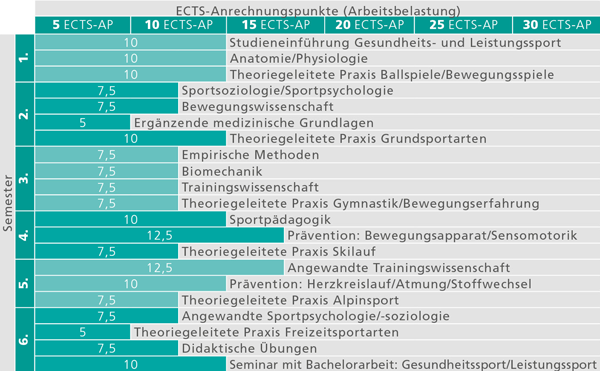Bachelorstudium Gesundheits- und Leistungssport
Curriculum (2007W)
Ab dem Wintersemester 2015/2016 darf eine Zulassung zu diesem Studium nicht mehr erfolgen.
Bachelor of Science (BSc)
Dauer/ECTS-AP
6 Semester/180 ECTS-AP
Studienart
Vollzeit
Voraussetzung
Matura oder Äquivalent
Fakultät
Fakultät für Psychologie und Sportwissenschaft
Niveau der Qualifikation
Bachelor (1. Studienzyklus)
Studienkennzahl
UC 033 628
Zusatzprüfung
Die Ergänzungsprüfung der körperlich-motorischen Eignung muss vor der Zulassung zum Studium nachgewiesen werden.
* Informationen zum Curriculum (2007W)
- Mitteilungsblatt vom 29.06.2015, 77. Stück, Nr. 507 (Auflassung ordentlicher Studien)
- Mitteilungsblatt vom 27.04.2007, 41. Stück, Nr. 207
Empfohlener Studienverlauf
Der unten angeführte, exemplarische Studienverlauf gilt als Empfehlung für Vollzeitstudierende, die das Studium im Wintersemester beginnen. Die Aufstellung dient der Darstellung eines möglichen Studienablaufs und ist nicht verpflichtend. Etwaige Prüfungswiederholungen bzw. deren studienzeitverzögernde Wirkung sind nicht berücksichtigt.
Die Regelstudienzeit beträgt 6 Semester bzw. 180 ECTS-AP, wobei gemäß Universitätsgesetz die Arbeitsbelastung eines Studienjahres 1.500 (Echt-)Stunden zu betragen hat und dieser Arbeitsbelastung 60 Anrechnungspunkte zugeteilt werden (ein ECTS-Anrechnungspunkt entspricht einer Arbeitsbelastung der Studierenden von 25 Stunden).
10,0 ECTS-AP: Studieneinführung Gesundheits- und Leistungssport
10,0 ECTS-AP: Anatomie/Physiologie
10,0 ECTS-AP: Theoriegeleitete Praxis Ballspiele/Bewegungsspiele
7,5 ECTS-AP: Sportsoziologie/Sportpsychologie
7,5 ECTS-AP: Bewegungswissenschaft
5,0 ECTS-AP: Ergänzende medizinische Grundlagen
10,0 ECTS-AP: Theoriegeleitete Praxis Grundsportarten
7,5 ECTS-AP: Empirische Methoden
7,5 ECTS-AP: Biomechanik
7,5 ECTS-AP: Trainingswissenschaft
7,5 ECTS-AP: Theoriegeleitete Praxis Gymnastik/Bewegungserfahrung
10,0 ECTS-AP: Sportpädagogik
12,5 ECTS-AP: Prävention: Bewegungsapparat/Sensomotorik
7,5 ECTS-AP: Theoriegeleitete Praxis Skilauf
12,5 ECTS-AP: Angewandte Trainingswissenschaft
10,0 ECTS-AP: Prävention: Herzkreislauf/Atmung/Stoffwechsel
7,5 ECTS-AP: Theoriegeleitete Praxis Alpinsport
7,5 ECTS-AP: Angewandte Sportpsychologie/-soziologie
5,0 ECTS-AP: Theoriegeleitete Praxis Freizeitsportarten
7,5 ECTS-AP: Didaktische Übungen
10,0 ECTS-AP: Seminar mit Bachelorarbeit: Gesundheitssport/Leistungssport

Informationen zur Prüfungsordnung inkl. Bewertung und Benotung
Prüfungsordnung
Die Prüfungsordnung ist integraler Bestandteil des Curriculums, detaillierte Informationen finden Sie unter dem Paragrafen Prüfungsordnung.
Bei der Notenverteilungsskala handelt es sich um die statistische Darstellung der Verteilung aller positiv absolvierten Prüfungen, die innerhalb eines Studiums bzw. eines Studienfaches (unter Heranziehung aller gemeldeten Studierenden eines Studiums bzw. eines Studienfaches) erfasst wurden. Die Notenverteilungsskala wird in regelmäßigen Abständen aktualisiert.
| A | B | C | D | E |
|---|---|---|---|---|
| Österreichische Notenskala | Definition | %-Satz | ||
| 1 | SEHR GUT: Hervorragende Leistung | 35,4 | = 100% | |
| 2 | GUT: Generell gut, einige Fehler | 35,4 | ||
| 3 | BEFRIEDIGEND: Ausgewogen, Zahl entscheidender Fehler | 21,0 | ||
| 4 | GENÜGEND: Leistung entspricht den Minimalkriterien | 8,2 | ||
| 5 | NICHT GENÜGEND: Erhebliche Verbesserungen erforderlich, Erfordernis weiterer Arbeit |
Gesamtbeurteilung der Qualifikation
Nicht zutreffend
Erklärung: Eine Gesamtbeurteilung (mit Auszeichnung bestanden, bestanden, nicht bestanden) wird nur über eine studienabschließende Prüfung, die aus mehr als einem Fach besteht, vergeben (im Curriculum dieses Studiums ist diese nicht vorgesehen).

